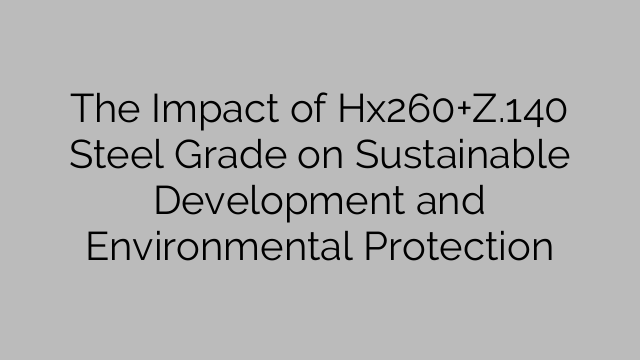The steel industry is a major contributor to global carbon emissions and environmental degradation. As the demand for steel continues to rise, it is essential to develop steel grades that minimize the environmental impact while maximizing sustainability. One such steel grade that has emerged as a game-changer in this regard is Hx260+Z.140.
Hx260+Z.140 is a high-strength steel grade that offers exceptional mechanical properties, including high yield strength, excellent formability, and good weldability. These properties make it suitable for a wide range of applications, from construction and infrastructure to automotive and manufacturing. However, the real impact of Hx260+Z.140 lies in its contribution to sustainable development and environmental protection.
One of the main advantages of Hx260+Z.140 is its reduced environmental footprint. The production of this steel grade requires less energy and raw materials compared to traditional steel grades, resulting in lower carbon emissions and resource depletion. This makes Hx260+Z.140 a more environmentally friendly option for various industries and applications.
Moreover, the high strength and formability of Hx260+Z.140 enable the production of lighter and more durable components, leading to reduced material consumption and waste. This not only lowers the overall environmental impact but also promotes resource efficiency and circular economy principles.
Furthermore, the use of Hx260+Z.140 in various applications contributes to the overall sustainability of infrastructure and products. The high yield strength and superior corrosion resistance of this steel grade result in longer service life and reduced maintenance needs. This leads to lower lifecycle costs and decreased environmental impact over the long term.
In addition to its environmental benefits, Hx260+Z.140 also plays a crucial role in sustainable development. By providing a more efficient and eco-friendly alternative to traditional steel grades, it supports the transition towards a more sustainable and low-carbon economy. The use of Hx260+Z.140 in construction, transportation, and manufacturing not only improves the performance and reliability of products and infrastructure but also contributes to the overall sustainability of these sectors.
In conclusion, the impact of Hx260+Z.140 on sustainable development and environmental protection is undeniable. Its reduced environmental footprint, resource efficiency, and contribution to sustainability make it a key player in the steel industry’s efforts to mitigate climate change and promote environmental stewardship. As the demand for sustainable and eco-friendly solutions continues to grow, Hx260+Z.140 is poised to make a significant and lasting impact on the future of steel production and application.

